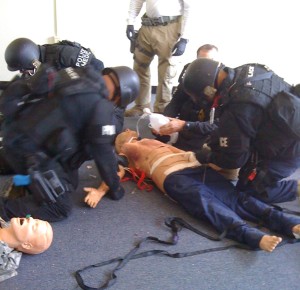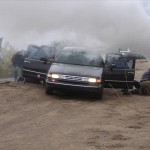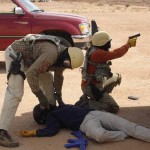
- This course has passed.
Course Navigation
 “In high risk environments, lives are not saved by doctors and nurses. Lives are saved by the person who provides early and effective first aid.”
“In high risk environments, lives are not saved by doctors and nurses. Lives are saved by the person who provides early and effective first aid.”
This course is designed for the EMT-B, paramedic, PA, RN, or MD, that may have to provide out-of-hospital care in austere environments with the possibility of having no other medical care for extended periods of time. The program emphasizes expedient management of life, limb, and sight-threatening injuries and illnesses.

This course will follow the guidelines of the widely accepted Tactical Combat Casualty Care (TCCC) core concepts. TCCC has become the standard of care for the tactical management of combat casualties within the Department of Defense and is the sole standard of care dually endorsed by both the American College of Surgeons and the National Association of Emergency Medical Technicians (NAEMT) for casualty management in tactical environments. The focus of the instruction is to give the operator the ability to recognize, evaluate and control life threatening wounds, airway compromise and chest trauma, that present during a tactical mission by using an IFAK and aid bag. Operators will take the IFAK home with them and can use the pre-packaged kit in their daily deployments or tactical missions.
The course will cover the following information:
- TEMS introduction
- Point of wounding care
- TCCC
- Care under fire
- Tactical field care
- CASEVAC (casualty evacuation)
- Evaluating a casualty
- Equipment selection
- Advanced airway techniques
- Surgical airways
- Intubation
- Low to no light airway management
- Chest trauma management
- Needle decompression
- Controlling massive hemorrhage
- Tourniquets and other tools
- Shock assessment and management
- Saline lock and IV therapy
- Fluid selection
- Multiple casualty situations
- Movement of causality using common and improvised methods
- Prolonged care of the injured patient
- New medical items/tools on the market
- Tactical equipment
- Tactical movement
- Room/building clearing procedures
- Firearms safety training
- Familiarization fire of two weapons systems
35 CEU hours have been approved, which is acceptable to the National Registry of EMTs for all levels of EMS recertification.
“This course has been determined to qualify for POST continuing training credit.” 40 continuing training hours will be awarded to AZ POST certified participants that meet all the course objectives.
Course Schedule:
Day 1: 0745 – 1700
Day 2: 0800 – 1700
Day 3: 0800 – 1700
Day 4: 0800 – 1700
Day 5: 1330 – 2200
Days one, two and three are mainly classroom based with lecture and skill stations. The focus of day four is primarily non-medical. Day five is designed to test your new skills in the field and to put into practice what was learned in the classroom with extremely realistic scenario based training. This will include a day and night exercise.
Prerequisites: None. This course is open to the public.
Warning: This course requires strenuous physical activity, especially during the field training exercises. Students will be exposed to a variety of conditions, including, but not limited to:
- Simulated tactical operations
- Incoming fire with weapons firing blanks or soft projectiles (simunitions, paintballs, airsoft, and other “non-lethal” projectiles)
- Pyrotechnics
- Darkness with austere field conditions
- Field training under rigorous and demanding psychological stress
- Operating in tactical gear during extreme weather conditions, including heat. Applicants who are not in excellent physical condition and who do not participate in a regular physical conditioning program should seek the approval of their physician before participating
Required Equipment: Expendable clothing (there is a possibility that it may be permanently stained with fake blood). Elbow and knee pads are optional, but highly recommended. Also recommended, if available, is tactical body armor, helmet, eye protection, hydration system, flashlight with red/blue lens, gloves, and any other tactical or medical gear/equipment used by your organization. Contact us to make arrangements for equipment that you or your organization do not have. All other training equipment, including weapons, will be provided for the course.
This course can be reserved anytime for your agency. Contact us to set up a private course.
